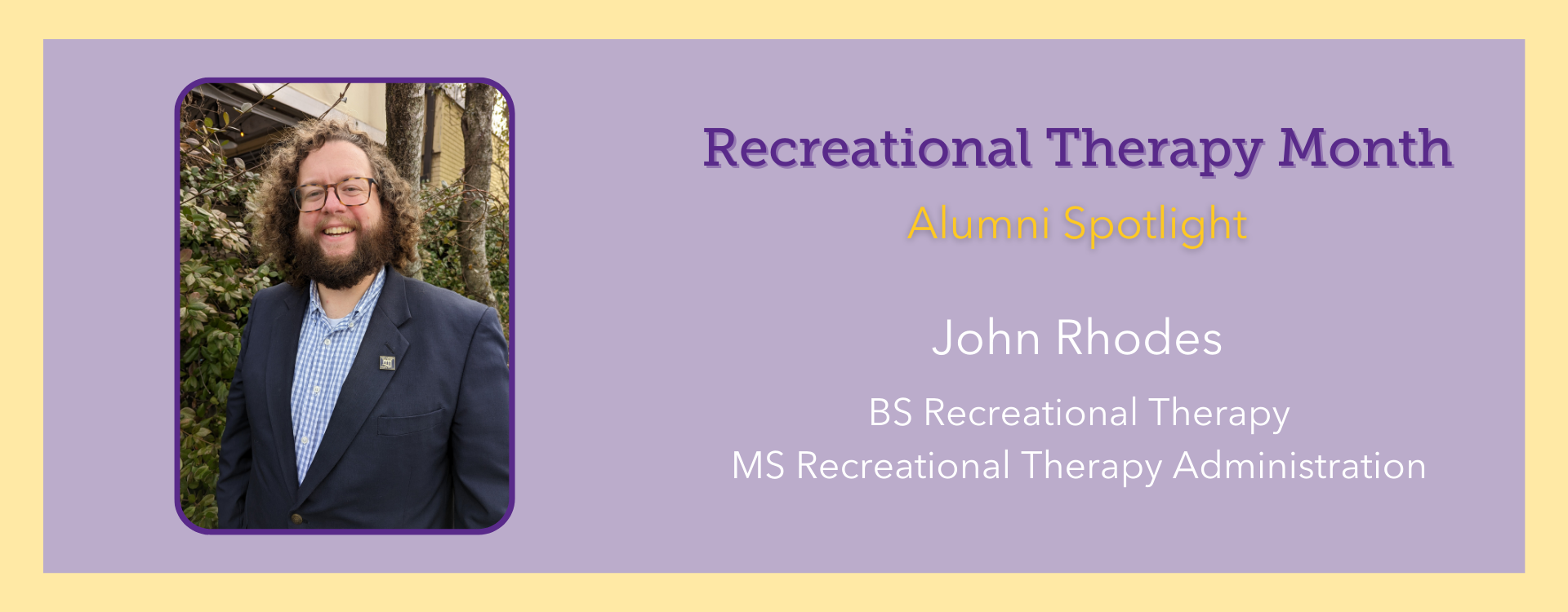Recreational Therapy Alumni Spotlight: John
Name: John D. Rhodes
Degree & Graduation Year: BS in Recreational Therapy, class of 2008 & MS in Recreational Therapy Administration, class of 2011. Upon graduation, received CTRS and LRT certifications.
How did you become interested in this field?
Like many folks in RT, I fell into RT from another major, however I was looking for a helping profession, and after internship I knew I had found it.
What were some of your favorite recreational therapy courses at ECU?
Some of my favorite courses at ECU included Interventions with Wendy Whisner, which was fun, educational, and I still use several things I learned in the class. Biofeedback with Dr. Russoniello created a foundation of stress management that I still use today. Also, the best summer course I took was Dr. Loy’s adaptive camp class that had us learning and helping with recreational therapy camps.
Describe your job/role/current employer?
I currently work as a Recreation Therapist for the Federal Bureau of Prison – Butner Complex. I provide therapy for mental health, cancer, and high medical need inmates. I provide a wide variety of treatments, from participating in a group such as learning leisure skills, developing coping skills, and learning how to better manage their pain.
The Federal Bureau of prisons is charged with the responsibility of care and custody of the inmates in their care. The interesting thing about working for the Federal Bureau of prisons is that every staff member is also an officer, so I am one of the few Federal Law Enforcement Officers who works as a Recreation Therapist. In addition to providing therapy to the inmates, I am also on the Correctional Support Team that supports staff and staffs families during crisis.
What is a typical day like for you?
I run a variety of groups and individual treatments ranging from Drum circle, Team building, Cognitive Remediation, and Leisure Education groups. My work schedule is from 7:30 am to 4:00 pm Monday through Friday.
What has been your favorite experience working in recreational therapy so far?
I run a therapeutic garden and I first opened it up during the COVID lockdown, many of the inmates hadn’t had a chance to get outside as often as they would have liked. As they began exploring the space they were asking what was the space for. When I told them it was for them to grow plants, several of them presented with bright affect and started planning out what we could grow. We spent the season prepping and planting. One inmate even started seedlings in his cell window. We didn’t have a huge crop that year, but the carrots and tomatoes were well cared for.
Where do you see the future of recreational therapy headed?
I see recreational therapy continuing to provide a critical role in the treatment of patients in a variety of settings, but not without the passion and care from the up and coming graduates soon to enter our field.
What is the greatest challenge recreational therapists face?
One of the greatest challenge recreational therapist faces is getting recognized for the amazing things they do. We often are behind the scenes or running beneficial programs that just don’t get the recognition that they often deserve.
What advice would you give to students who wish to enter this field?
The best advice I would give students is play their strengths. Find out what you are passionate about and bring that passion to your clients.
This year’s theme for recreational therapy month is “finding your place.” Can you share your experience(s) that helped you find your place within the field or certain area (or population) of RT?
Finding your place has a special meaning to me. I am currently in a wonderful job working with a population I am passionate about, but I didn’t start here. I started at a entry level job as an RT in a state maximum security prison. I used the work ethic and skills that I learned at ECU to provide wonderful services, but I ended up where I am now through staying connected with other RTs and volunteering the NCRTA. I got my current job by staying connected with NCRTA through an RT who was leaving the job at the Federal Bureau of Prisons.
